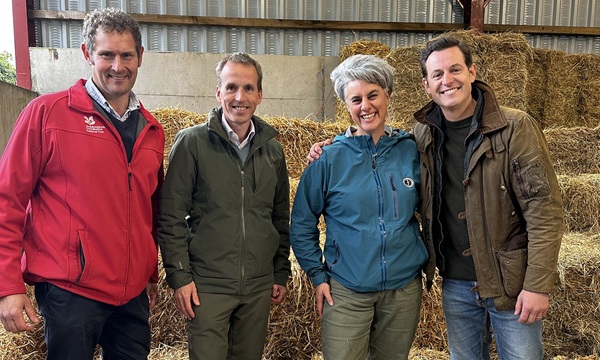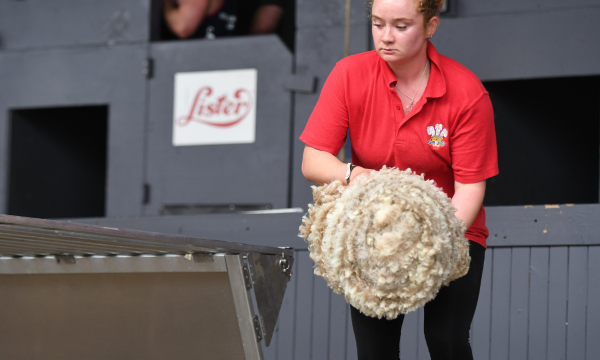Data collected by the agricultural co-operative society Welsh Lamb & Beef Producers Ltd (WLBP) regarding antimicrobial use on farms in Wales is enhancing consumer trust and boosting confidence in farming.
Farmer-controlled WLBP is at the forefront of measuring antimicrobial use (AMU) on farms in the UK and Europe, contributing to the global drive to combat antimicrobial resistance in both animals and humans.
The third published WLBP Antimicrobial Use Report presents a comprehensive summary of AMU for 2023 on 6,060 beef, sheep and dairy enterprises across Wales, covering January 1st to December 31st, 2023.
Measuring AMU on farms is a part of the WLBP Farm Assured Welsh Livestock Scheme (FAWL). WLBP members work with their veterinary surgeons to determine the amount of antimicrobials used on farm using the WLBP AMU Calculator, where annual farm AMU reports are produced. These farm-specific AMU reports are easy to generate, enabling farmers and veterinary surgeons to dedicate their time to discussions about animal health and production on their farms. This innovative reporting tool produces standardised AMU reports based on metrics agreed upon by the industry. The results are presented in milligrams of antimicrobials used per kilogram of animal mass (mg/kg), a measurement recognized by government and supply chain stakeholders.
Collation of data obtained through the WLBP AMU Calculator provides an average picture of the amount of antimicrobials used on beef, sheep and dairy farms in Wales.
Commissioned by WLBP and independently conducted by researchers at the Bristol Veterinary School, University of Bristol, the 2023 WLBP AMU Report offers valuable insights into how the Welsh beef, sheep and dairy sectors are responding to emerging risks of antimicrobial resistance. The report also addresses the pressures to maintain the effectiveness of antimicrobials through responsible and reduced usage.
The 2023 report reveals that 6060 calculations have been completed by farmers, representing an increase in calculations compared to 2022 figures. Since the release of WLBP’s report for 2021, there has been a significant rise in the number of beef, sheep and dairy enterprises actively using the AMU Calculator, with increases of 160%, 135% and 100%, respectively.
The 2023 report includes new sections created using the AMU Calculator, detailing month-on-month AMU purchasing variations categorized by enterprise type and administration route.
Welsh farmers have embraced the voluntary approach taken by WLBP, which is believed to have resulted in the largest independent data set of its kind in the UK.
Iestyn Tudur-Jones, General Manager of WLBP, emphasised the significance of collaborating with its members and voluntary nature of the approach which is leading to reassurances for food producers and processors, increasing public confidence in Welsh farming, as well as playing a key role in combating AMR.
He said:
“At WLBP, we recognise the importance of co-designing standards with our members and industry stakeholders. This third report on AMU in Wales by WLBP is underpinned by collaboration between farmers, vets, government and supply chain.”
He said the data was invaluable in reinforcing the credentials of livestock production in Wales and put farmers at the forefront of its aim.
He added:
“By completing this process, farmers can also navigate their data to fulfil any supply chain demands that may request such information. This system allows the farmer to complete the task once but utilise and share their data under their control as often as they wish.”
Kristen Reyher, a Professor of Veterinary Epidemiology and Population Health at the University of Bristol, highlighted the importance of having a growing database and its contribution to broader AMR research.
She said:
“It is great to see Welsh farmers working hard to steward these important medicines. Having continuous data on as many farms as possible allows us to track usage over time and monitor trends in order to help evidence this stewardship across the Welsh livestock industries. Such excellent data also helps us to unravel the complicated relationships between usage and AMR.”
WLBP’s work on AMU forms an integral part of the award-winning Arwain DGC (Defnydd Gwrthficrobaidd Cyfrifol / Responsible Antimicrobial Use) programme, which is funded by the Welsh Government and led by Mentera.
Iestyn said:
“Being a part of the Arwain DGC programme has been invaluable for WLBP, and we are grateful for the support of the Welsh Government.”
Chris Lloyd, Secretary General of RUMA Agriculture, said:
“Welsh Beef and Lamb producers have led the way in antibiotic use data collection and shown how it can be used as a vital part of a discussion between a farmer and his vet to ensure proactive and responsible management of health and disease on the farm.”
The report was also welcomed by Gwyn Jones, Chairman of the UK Ruminant Health and Welfare Group.
He said:
“I congratulate WLBP on a detailed and excellent report which shows that Welsh farmers are taking the threat of AMR seriously. I would also like to thank WLBP for their vital contribution to the Industry UK Medicine Hub at AHDB.”
The WLBP Antimicrobial Use Report 2023 can be found here.







